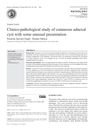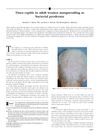 21 citations,
December 2016 in “European journal of pharmaceutics and biopharmaceutics”
21 citations,
December 2016 in “European journal of pharmaceutics and biopharmaceutics” Nano-sized lipid particles increase dexamethasone's skin penetration and create a reservoir in the skin layers.
 January 2022 in “Skin appendage disorders”
January 2022 in “Skin appendage disorders” A woman with alopecia totalis regrew dark hair in bands after using a corticosteroid ointment.
 8 citations,
January 2022 in “Burns and trauma”
8 citations,
January 2022 in “Burns and trauma” Skin cell-derived vesicles can help heal skin injuries effectively.
[object Object] 16 citations,
January 2019 in “Pharmaceutical biology” Lespedeza cuneata extract may help treat enlarged prostate.
 1 citations,
August 2018 in “bioRxiv (Cold Spring Harbor Laboratory)”
1 citations,
August 2018 in “bioRxiv (Cold Spring Harbor Laboratory)” A new mutation in the TMEM173 gene and a risk allele in IFIH1 cause a unique set of immune-related symptoms.
488 citations,
July 2021 in “Cell” Fibroblasts are crucial for tissue repair and inflammation, and understanding them can help treat fibrotic diseases.
 14 citations,
October 2019 in “International Journal of Women's Health”
14 citations,
October 2019 in “International Journal of Women's Health” Menopausal acne is treated with medications and lifestyle changes, but careful choice is needed due to side effects.
 2 citations,
September 2021 in “Journal of Pathology of Nepal”
2 citations,
September 2021 in “Journal of Pathology of Nepal” Most skin cysts were common types found in unusual body parts, and examining tissue samples is important for accurate diagnosis.
28 citations,
September 2021 in “EMBO reports” Osthole inhibits the TRPV3 channel by binding to specific sites, potentially aiding drug development for skin diseases and cancers.
 119 citations,
January 2012 in “Nutrition & Metabolism”
119 citations,
January 2012 in “Nutrition & Metabolism” Modern lifestyles, including poor diet, stress, and long-term use of certain medications, hinder the body's ability to heal from inflammation, leading to chronic diseases.
9 citations,
August 2021 in “International journal of molecular sciences” PPARγ is essential for maintaining healthy skin, controlling inflammation, and ensuring proper skin barrier function.
 66 citations,
March 2009 in “British journal of surgery”
66 citations,
March 2009 in “British journal of surgery” Hidradenitis suppurativa treatment should be tailored to the individual, with quitting smoking being important.
Different types of sun exposure damage skin cells and immune cells, with chronic exposure leading to more severe and lasting damage.
 16 citations,
December 2012 in “The Clinical Journal of Pain”
16 citations,
December 2012 in “The Clinical Journal of Pain” Chronic scalp pain in trichodynia involves both body-wide and localized increased pain sensitivity.
 7 citations,
August 2018 in “South African Medical Journal”
7 citations,
August 2018 in “South African Medical Journal” Clinicians should understand tattoos to manage health issues, as tattoos can cause complications and affect medical assessments.
 280 citations,
July 2018 in “Antioxidants”
280 citations,
July 2018 in “Antioxidants” Treatments that reduce oxidative stress and fix mitochondrial problems may help heal chronic wounds.
 39 citations,
May 2011 in “Human Immunology”
39 citations,
May 2011 in “Human Immunology” Genetics play a role in acne, but how exactly they contribute is not fully understood.
 102 citations,
January 2003 in “Dermatology”
102 citations,
January 2003 in “Dermatology” Smoking may contribute to hair loss in men.
 1 citations,
February 2009 in “Journal of The American Academy of Dermatology”
1 citations,
February 2009 in “Journal of The American Academy of Dermatology” Children's Serum Sickness-Like Reaction is often linked to antibiotics, especially amoxicillin, and involves symptoms like rash, fever, and joint issues.
[object Object]  September 1997 in “JEADV. Journal of the European Academy of Dermatology and Venereology/Journal of the European Academy of Dermatology and Venereology”
September 1997 in “JEADV. Journal of the European Academy of Dermatology and Venereology/Journal of the European Academy of Dermatology and Venereology” Blocking IL-1 could help treat some hair loss conditions; alopecia affects liver detox systems; spironolactone is better than finasteride for female hair growth; focusing on the catagen hair phase could lead to new alopecia treatments.
 7 citations,
January 2021 in “Biology”
7 citations,
January 2021 in “Biology” Some COVID-19 patients have different skin problems, which might be the only sign of the virus or related to other health issues.
 5 citations,
April 2022 in “Frontiers in Medicine”
5 citations,
April 2022 in “Frontiers in Medicine” Hair and skin healing involve complex cell interactions controlled by specific molecules and pathways, and hair follicle cells can help repair skin wounds.
 March 2021 in “bioRxiv (Cold Spring Harbor Laboratory)”
March 2021 in “bioRxiv (Cold Spring Harbor Laboratory)” A specific immune response helps control mite populations on the skin, maintaining healthy hair follicles.
 May 2023 in “Buletin Veteriner Udayana”
May 2023 in “Buletin Veteriner Udayana” Dogs with dermatitis show significant skin changes and higher white blood cell counts.
 January 2024 in “Pan African Medical Journal”
January 2024 in “Pan African Medical Journal” Non-scarring hair loss is common in lupus patients and can be diagnosed with specific hair and tissue tests.
13 citations,
July 2015 in “Archives of dermatological research” N1-methylspermidine helps hair growth and reduces inflammation in hair follicles.
 October 2023 in “Research Square (Research Square)”
October 2023 in “Research Square (Research Square)” Oxidative stress is linked to mild patchy alopecia areata.
 78 citations,
October 2020 in “Experimental Dermatology”
78 citations,
October 2020 in “Experimental Dermatology” Hidradenitis suppurativa is caused by genetic factors, inflammation, bacteria, hormones, and lifestyle factors like obesity and smoking.
 32 citations,
August 2003 in “Journal of the American Academy of Dermatology”
32 citations,
August 2003 in “Journal of the American Academy of Dermatology” Tinea capitis can be misdiagnosed as bacterial infection in adult women but is treatable with antifungal medication.
 5 citations,
November 1992 in “Current problems in dermatology”
5 citations,
November 1992 in “Current problems in dermatology” Glucocorticoids are powerful anti-inflammatory drugs that must be used carefully to avoid serious side effects.























